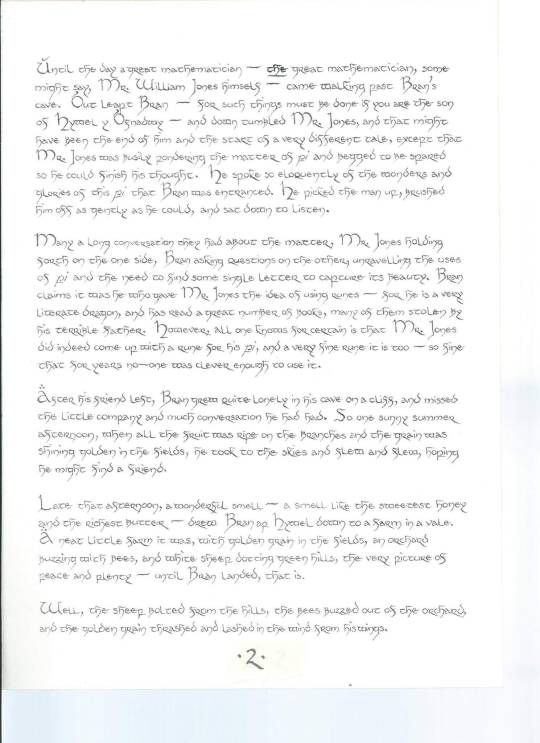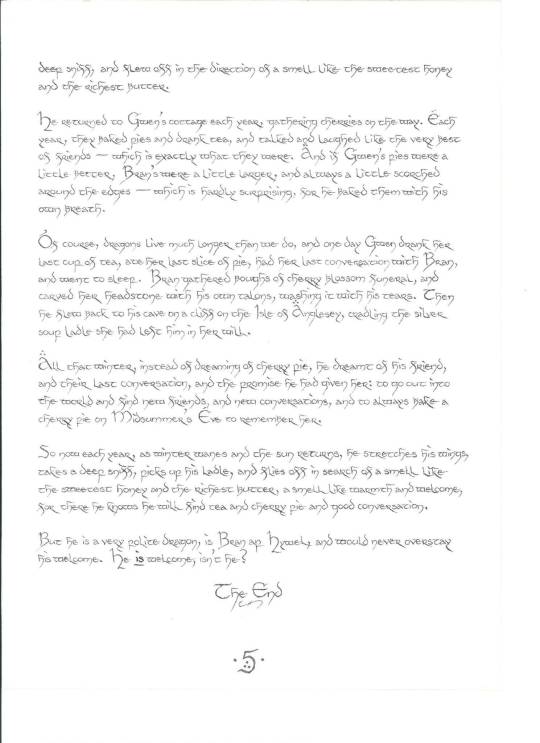#this is how Bretha tells her tales and stories
Explore tagged Tumblr posts
Text
I wrote this little tale to accompany a sculpture I was commissioned to make as a wedding gift. I promptly ran out of printer toner, but still had a bottle of ink, a dip nib and a very strange set of priorities whereby handwriting the story in calligraphic script appealed more than leaving the house and spending money on printer ink.
And thus my longest calligraphic project was embarked upon!
No alt text for the images, but the full text depicted is in plain text under the Read more.





THE TALE OF BRAN AP HYWEL Y CEIRIOS
Once upon a time… for that is how all such tales begin, is it not? Once upon a time, there were many dragons. And the fiercest, most famous dragon in all the land was Y Ddraig Goch, the Red Dragon of Cadwalladr. Many songs and tales there are of Y Ddraig Goch, but none give his name, for indeed no-one thought to ask it.
But a name he had – two names, in fact. Dragons always have two names, the one being short and easy for mere humans to pronounce, the other as long and twisting as dragons themselves. It grows with the dragon who bears it, and if you know how large a dragon can grow, you know just how long that is.
Only the dragons know the long name of Y Ddraig Goch, but to we poor mortals we would more properly have been named Hywel Y Ofnadwy – and terrible he was in name and deed alike! You may well know the story of his battles with the White Dragon of Albion, and of the many slain by his talons and flame.
But what is less well known is that he had a son, Bran, who was nothing like his father. Bran ap Hywel was but a wee young wyrm when his terrible father fell to the swords of men, and barely remembers him.
For years and years past counting, Bran lived quietly in his cave on a cliff on the Isle of Anglesey. Aside from the occasional fish (which he enjoyed well enough), an even more occasional sheep (which he enjoyed better) and the gulls and terns that shared his cliff, Bran had little company and no conversation.
Until the day a great mathematician – the great mathematician, some might say, Mr William Jones himself – came walking past Bran’s cave. Out leapt Bran – for such things must be done if you are the son of Hywel Y Ofnadwy – and down tumbled Mr Jones, and that might have been the end of him and the start of a very different tale, except that Mr Jones was busily pondering the matter of pi and begged to be spared so he could finish his thought. He spoke so eloquently of the wonders and glories of this pi that Bran was entranced. He picked the man up, brushed him off as gently as he could, and sat down to listen.
Many a long conversation they had about the matter, Mr Jones holding forth on the one side, Bran asking questions on the other, unravelling the uses of pi and the need to find some single letter to capture its beauty. Bran claims it was he who gave Mr Jones the idea of using runes – for he is a very literate dragon, and has read a great number of books, many of them stolen by his terrible father. However, all one knows for certain is that Mr Jones did indeed come up with a rune for his pi, and a very fine rune it is too – so fine that for years no-one was clever enough to use it.
After his friend left, Bran grew quite lonely in his cave on a cliff, and missed the little company and much conversation he had had. So one sunny summer afternoon, when all the fruit was ripe on the branches and the grain was shining golden in the fields, he took to the skies and flew and flew, hoping he might find a friend.
Late that afternoon, a wonderful smell – a smell like the sweetest honey and the richest butter – drew Bran ap Hywel down to a farm in a vale. A neat little farm it was, with golden grain in the fields, an orchard buzzing with bees, and white sheep dotting green hills, the very picture of peace and plenty – until Bran landed, that is.
Well, the sheep bolted from the hills, the bees buzzed out of the orchard, and the golden grain thrashed and lashed in the wind from his wings.
Gwen, the farmer, ran from her thatched cottage to see what all the fuss was about, and found herself staring into the glowing green eyes of a great red dragon, high as her house and twice as long, folding his wings and staring right back at her.
“Good afternoon, madam,” said Bran (for he was a very polite dragon), “I do apologise for intruding. My name is Bran ap Hywel y Ofnadwy, though I am nowhere near as terrible. I was passing by in search of friendly conversation, when I caught the mmost marvellous smell – a smell like the sweetest honey and the richest butter – wafting from your charming little cottage. I know that the best conversation always occurs in the presence of fine victuals, and I therefore wondered if I might perhaps beg your indulgence and try a morsel?”
Well, poor Gwen didn’t know what to think! She stared up at this great red dragon, speaking as clearly as her vicar and twice as polite, and tried not to imagine all the things that might smell to a dragon like the sweetest honey and the richest butter. But she, too, was polite, and knew it was only good manners to offer tea to guests, however unexpected.
“If you’ll just wait here for a moment, sir, I’ll bring you out a cup of tea. As for whatever you smelled, couldn’t say for certain what it was, but I took a cherry pie from the oven not two minutes ago – would a bit of pie suit?”
Bran’s eyes lit up – and when it comes to a dragon, that is no metaphor – for here was another person who knew about pi!
“That would be delightful, madam, and I would be honoured if you would join me, to talk about the pi.”
The tea was ready in a trice – even with Gwen’s hands trembling and shaking – and was only a little spilled. She fetched her grandmother’s soup tureen of fine bone china for the dragon’s cup, and laid the pie on her best Sunday serving plate. Then, all a-flutter and a-tremble, she brought out her rocking chair and her sewing table, laid a fresh white cloth and her silver soup ladle for the dragon’s spoon, and brought out the tea and pie.
Bran bowed his thanks and waited ever so quietly while Gwen poured the tea and cut him a slice of pie (which was rather more than half). Once she had another cup of tea and a slice of pie for herself, Bran lifted the ladle carefully between his claws and took a nibble. Such a flavour he had never known! Sweeter than honey, richer than butter – better than all the sheep he had ever tasted. His eyes glowed with happiness, and smoke rose from both nostrils in his delight.
“Madam, this is the most marvellous, most delectable thing I have ever had the pleasure of eating. May I ask what it is?”
“Cherry pie, sir, my mother taught me the recipe.” Gwen watched him take another mouthful and savour it. “I daresay I’ve improved on it a bit, for people do tell me my pie is better than hers. Have you never had cherry pie before?”
Bran sighed. “Alas, madam, I have not – but I see now why my dear friend Mr William Jones was so enamoured of it.” And with that, he took another mouthful, and the pie was all gone.
All that summer and into the autumn, Bran stayed by Gwen’s little thatched cottage. He fetched back her sheep – for you may remember they all ran off when he first arrived – and re-thatched her roof, and brought her sweet wild cherries by the bucketful. Gwen taught him her mother’s recipe for cherry pie – with her own improvements, of course. And many a conversation they had over tea and pie, until Gwen quite forgot she had ever been afraid of him.
When the snows came, Bran said his farewells and returned to his quiet cave on a cliff on the Isle of Anglesey, to curl up and dream of cherry pie until spring. When the winter waned and the sun returned, Bran stretched his wings, took a deep sniff, and flew off in the direction of a smell like the sweetest honey and the richest butter.
He returned to Gwen’s cottage each year, gathering cherries on the way. Each year, they baked pies and drank tea, and talked and laughed like the very best of friends – which is exactly what they were. And if Gwen’s pies were a little better, Bran’s were a little larger, and always a little scorched around the edges – which is hardly surprising, for he baked them with his own breath.
Of course, dragons live much longer than we do, and one day Gwen drank her last cup of tea, ate her last slice of pie, had her last conversation with Bran, and went to sleep. Bran gathered boughs of cherry blossom for her funeral, and carved her headstone with his own talons, washing it with his tears. Then he flew back to his cave on a cliff on the Isle of Anglesey, cradling the silver soup ladle she had left him in her will.
All that winter, instead of dreaming of cherry pie, he dreamt of his friend and their last conversation, and the promise he had given her: to go out into the world and find new friends, and new conversations, and to always bake a cherry pie on Midsummer’s Eve to remember her.
So now each year, as winter wanes and the sun returns, he stretches his wings, takes a deep sniff, picks up his ladle, and flies off in search of a smell like the sweetest honey and the richest butter, a smell like warmth and welcome, for there he knows he will find tea and cherry pie and good conversation.
But he is a very polite dragon, is Bran ap Hywel, and would never overstay his welcome. He is welcome, isn’t he?
THE END
Bonus pictures of Bran for any who wanted to meet him:





#my writing#the tale of bran ap hywel#apologies to all Welsh speakers for butchering such a beautiful language#this is the seed from which i hope the Tales of Bretha Stitchwitch and the Trials of Rowan Queensbane will sprout#this is how Bretha tells her tales and stories
16 notes
·
View notes